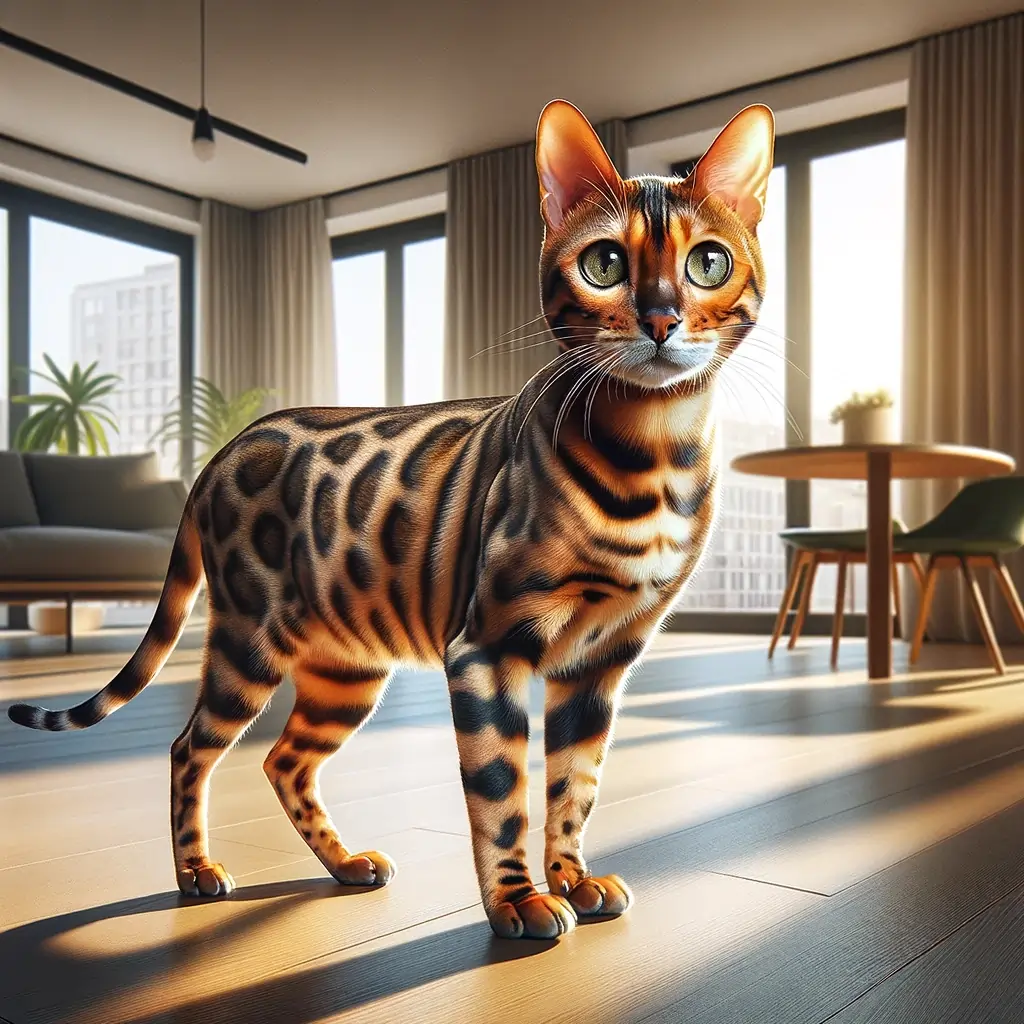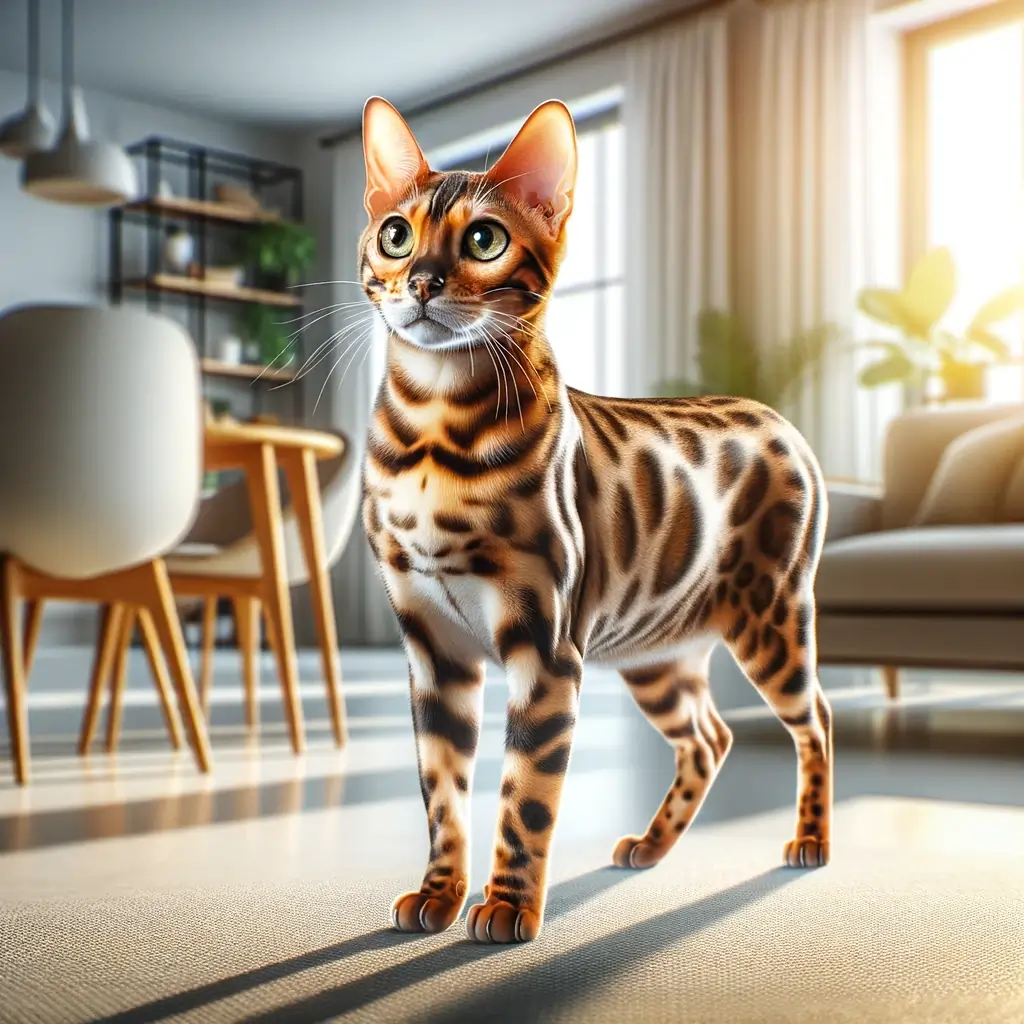In this article, we will explore the reasons why your Bengal cat may appear skinny and provide tips for maintaining a healthy weight for your feline friend. We’ll look at various factors such as diet, health issues, and exercise that could contribute to their slender appearance.
Additionally, we’ll discuss the importance of consulting with a veterinarian to rule out any underlying health conditions that may be causing your Bengal cat to be skinny. By understanding the potential causes and implementing appropriate strategies, you can ensure that your Bengal cat stays happy and healthy.
Are Bengal Cats Usually Skinny?
Bengal cats are a breed known for their sleek and slender physique. With ancestral ties to the wild Asian leopard cat, they have inherited a naturally lean and muscular build. These agile felines are often admired for their long and slender bodies, which set them apart from the average domestic cat. Bengals tend to weigh on the lighter side compared to other breeds, reflecting their strong and toned muscles.
One of the factors contributing to their skinnier appearance is their unique skeletal structure. Bengals have a rib cage that extends backward, emphasizing their slim waistline. This anatomical feature, combined with their well-developed hind legs and sleek front legs, gives them their characteristic slender look. It is important to note that while Bengal cats may appear skinny, they are well-proportioned and maintain a healthy body weight.
Understanding Healthy Weight for Bengal Cats
When it comes to determining whether your Bengal cat is at a healthy weight, it’s essential to consider their breed-specific characteristics. While they may appear skinny compared to other cats, it’s important to remember that Bengals have a different physique. As long as your cat falls within the average weight range for Bengals, they are likely in good health.
An adult Bengal cat typically weighs between 8-10 pounds for females and 10-15 pounds for males, which is considered a healthy weight for the breed. Their unique hip structure and placement contribute to their overall physique, giving them a slender appearance. As long as their nutrition needs are met and they have enough space to run and play, their slender figure is perfectly normal for Bengals.
Feeding your Bengal cat a raw food diet can provide them with the nutrition they need to maintain a healthy weight. Raw food diets mimic their natural diet in the wild and can help ensure they receive essential nutrients. However, it’s important to consult with a veterinarian to ensure their diet is balanced and meets their specific nutritional requirements.
The Importance of a Balanced Diet
A balanced diet is crucial for maintaining your Bengal cat’s health and preventing excessive weight loss. While there are various types of cat food available, including dry food and canned options, some Bengal cat owners opt for a raw food diet.
Raw meat provides essential nutrients and more closely aligns with a cat’s natural dietary needs. However, it’s important to consult with your veterinarian before transitioning your Bengal cat to a raw food diet to ensure they receive all the necessary nutrients in the right proportions.
When it comes to feeding your cat, there are several factors to consider. Quality meat is essential for a balanced diet that supports your Bengal cat’s overall health. Whether you choose to feed them raw or cooked meat, make sure it is of high quality and appropriate for feline consumption.
Canned foods can also be a good option as they often contain a higher moisture content, which helps keep your cat hydrated. Dry food can be convenient, especially when it comes to portion control, but it’s important to monitor your cat’s water intake to ensure they stay well-hydrated.
When considering a raw food diet for your Bengal cat, it’s essential to keep in mind that they require a specific balance of nutrients. A raw diet typically consists of raw meat, organ meat, and bones, providing essential proteins, fats, and calcium. It’s important to consult with your veterinarian to ensure your cat’s nutritional needs are met and to prevent any deficiencies or imbalances that could affect their health.
Nutritional Benefits of a Raw Food Diet
A raw food diet offers several potential benefits for your Bengal cat:
- High-quality protein: Raw meat provides a rich source of high-quality protein, which is essential for your cat’s muscle development and overall health.
- Natural moisture content: Raw meat contains a natural moisture content that helps keep your cat hydrated, reducing the risk of dehydration.
- Low carbohydrate intake: A raw food diet typically contains fewer carbohydrates than processed cat food, which can be beneficial for cats that are prone to weight gain.
- Minimal processing: Raw food diets avoid the potentially harmful additives and preservatives found in many commercial cat foods, offering a more natural and wholesome alternative.
Addressing Health Concerns
If your Bengal cat is consistently skinny despite adequate nutrition and a balanced diet, it’s crucial to rule out any underlying health issues. A visit to the veterinarian can help identify and address any health concerns that may be responsible for your cat’s skinny appearance.
Parasites, such as intestinal parasites, can affect a cat’s ability to gain weight. These parasites can disrupt the digestive system and prevent proper absorption of nutrients. Regular deworming and fecal examinations can help detect and treat intestinal parasites in your Bengal cat.
In addition to parasites, certain genetic conditions can contribute to weight loss in Bengal cats. One such condition is pyruvate kinase (PK) deficiency, a genetic disorder that affects the red blood cells’ ability to produce energy. Cats with PK deficiency may have a reduced appetite and experience weight loss. If you suspect your Bengal cat may have PK deficiency, genetic testing can provide a definitive diagnosis.
Another potential health concern is feline infectious peritonitis (FIP), a viral disease that can affect cats of all breeds, including Bengals. FIP can cause weight loss, along with other symptoms such as fever, lethargy, and fluid accumulation in the abdomen. Diagnosis of FIP can be challenging, and there is currently no cure. Supportive care and management of symptoms are the main treatment approaches for cats with FIP.
Exercise and Playtime for Bengals
Bengals are known for their lively and active nature, and they require ample exercise and playtime to stay happy and healthy. Keeping their high level of activity in mind is crucial for their overall well-being and weight management.
Encouraging regular playtime and engaging in interactive activities with your Bengal cat is essential to help them maintain a healthy weight. Their tireless spirit and innate need to jump and play, inherited from their wild Asian leopard cat ancestors, should be fulfilled to ensure their physical and mental stimulation.
To keep your Bengal cat fit and prevent excessive weight loss, incorporate regular play sessions into their daily routine. Interactive toys, puzzle feeders, and climbing structures can provide the necessary environmental enrichment and entertainment to keep them engaged.
- Engage in daily play sessions with interactive toys
- Provide climbing structures and scratching posts for physical activity
- Use puzzle feeders to stimulate their mental agility during mealtime
Bengal Exercise Tips:
- Set aside dedicated playtime each day, engaging your Bengal cat in interactive games and physical activities.
- Rotate and introduce new toys regularly to keep them engaged and curious.
- Create an environment that encourages climbing and jumping, such as cat trees or shelves.
Benefits of Exercise for Bengals:
- Helps maintain a healthy weight and prevent obesity
- Provides mental stimulation and prevents boredom
- Enhances muscle tone and agility
- Strengthens the bond between you and your Bengal cat
| Playtime Routine | Duration |
|---|---|
| Morning Playtime | 15-20 minutes |
| Afternoon Playtime | 15-20 minutes |
| Evening Playtime | 15-20 minutes |
| Nighttime Playtime | 10-15 minutes |

Ensuring Adequate Hydration
Proper hydration is essential for maintaining your Bengal cat’s overall health and well-being. Dehydration can lead to weight loss and other health issues, so it’s crucial to ensure that your cat has access to fresh water at all times.
Monitor your Bengal cat’s water intake regularly to ensure they are drinking enough. If you notice any signs of dehydration, such as dry gums or decreased urination, it’s important to take action promptly.
In addition to water, you can also consider incorporating wet food into your cat’s diet, as it provides additional moisture. Wet food can be a good source of hydration, especially if your Bengal cat is not drinking enough water on its own.
Consulting with a Veterinarian
If you’re concerned about your Bengal cat’s weight and overall health, it’s important to schedule a visit with a veterinarian. A professional examination and discussion about your cat’s history can help identify any underlying health issues that may be causing their skinny appearance. Your veterinarian can provide personalized advice and recommend appropriate diet and lifestyle modifications to help your Bengal cat achieve a healthier weight.
When it comes to your pet’s well-being, a veterinarian is the best source of knowledge and guidance. They have the expertise and experience to assess your Bengal cat’s condition and determine the most suitable plan of action. By consulting with a veterinarian, you can gain valuable insights into your cat’s health and take proactive steps to address any concerns.
Your veterinarian will conduct a thorough examination, taking into account various factors such as body weight, muscle tone, and overall condition. They may also ask about your cat’s diet, exercise routine, and any other relevant information. Based on the assessment, they can determine if any underlying health issues are contributing to your cat’s thin appearance.
Tips for Supporting Healthy Weight Gain
Depending on your Bengal cat’s age and current weight, your veterinarian may recommend specific strategies to support healthy weight gain. These may include adjusting their diet, providing additional calories if needed, or incorporating supplements. It’s essential to follow your veterinarian’s instructions carefully and monitor your cat’s progress. With the right approach and care, your Bengal cat can achieve a healthy weight and be fully content.
| Tip | Description |
|---|---|
| Feed Your Cat a Nutritious Diet: | Feeding your Bengal cat a balanced and high-quality diet is crucial for healthy weight gain. Consult with your veterinarian to ensure that your cat receives the right nutrients and portion sizes. Consider incorporating raw food into their diet, as it closely mimics their natural dietary needs. |
| Monitor Portion Sizes: | Ensure that you are providing your Bengal cat with adequate portion sizes. Work with your veterinarian to determine the appropriate amount of food based on their age, weight, and activity level. Split their meals into multiple small servings throughout the day to encourage healthy weight gain. |
| Offer Nutrient-Dense Snacks: | In addition to regular meals, consider offering nutrient-dense snacks to supplement your cat’s calorie intake. Discuss suitable options with your veterinarian, such as freeze-dried meat treats or specially formulated cat supplements. |
| Encourage Physical Activity: | Engaging your Bengal cat in regular play sessions and providing opportunities for exercise can help stimulate their appetite and promote healthy weight gain. Use interactive toys, climbing structures, and interactive feeding puzzles to keep them active and mentally stimulated. |
Conclusion
In conclusion, Bengal cats are naturally lean and slender due to their breed characteristics. These beautiful felines are supposed to be skinny, showcasing their agile and muscular physique. However, if you have concerns about your Bengal cat’s weight, it’s important to consult with a veterinarian to rule out any underlying health conditions.
Maintaining a balanced diet is crucial for your Bengal cat’s overall health and weight management. Consider feeding your cat a raw food diet that provides the essential nutrition they need. Additionally, providing opportunities for exercise and playtime will help your Bengal cat stay fit and maintain a healthy weight. Ensuring adequate hydration is also essential for their well-being.
By taking proper care and attention, you can help your Bengal cat achieve their ideal weight and enjoy a happy and healthy life. Remember, their slender appearance is entirely normal for this breed, and consulting with a veterinarian will help address any concerns you may have. Embrace your Bengal cat’s unique physique and provide them with the love and care they deserve.

Hey guys, My name is Simon Smith. I’m from Canada and live near Victoria
I live with my sweet family and have 20+ Ragdolls of different types. I love them as my own children. My profession is as a hotel manager.
I love to keep Ragdolls and grow their breeder case. I have 7 years of experience.
I’m an expert in cat care. So, I’m here to provide you with new information about my cats daily. This is my personal blog website, so I request that you kindly visit our site daily.
If you’re a Ragdolls lover and you have any questions or confusion about cats, text me on the Contact Us page or Gmail.
Thank u
